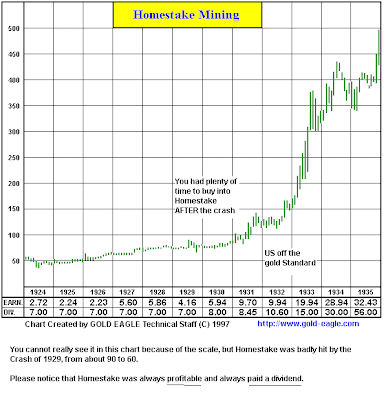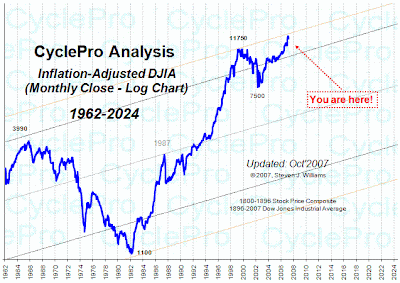 Wall Street's motto is "Never Give Up. Never Surrender. Greed is only a few heartbeats away from fear."
Wall Street's motto is "Never Give Up. Never Surrender. Greed is only a few heartbeats away from fear."
Banks are leading the rally on first of month 401k money from the US, hopes that the banks have or are reaching a bottom by European speculators based on the Lehman shares offering raising $4 billions, a quick pump from the Yen-dollar carry trade, the apparent revelation that the Treasury has agreed to backstop any Bear Stearns losses for the Fed, and... a little fresh lipstick.
Banks Face Biggest Crisis in 30 Years, Report Says
By Edward Evans
April 1 (Bloomberg) -- Credit market turmoil poses the most severe crisis for banks in 30 years, surpassing Black Monday in 1987, the Asia currency crisis and the burst of the dot-com bubble, Morgan Stanley and Oliver Wyman said in a joint report.
Revenue from investment banking may drop 20 percent in 2008 before a further $75 billion in markdowns, analysts led by Huw van Steenis said in a note to clients today. Six quarters of earnings will have been erased by writedowns and falling revenue by this month, rivaling the collapse of the junk bond market at the end of the 1980s that put Drexel Burnham Lambert Inc. out of business, the report said.
''The industry is facing the most severe investment banking crisis in 30 years,'' the analysts wrote in the report. ''Global securities markets are in the midst of profound cyclical and structural change.''
Banks' revenue from their credit businesses may drop as much as 60 percent, the analysts said, and the firms will have to provide more transparency to investors who buy their loans. At the same time, regulators will push the industry to retain more capital as a cushion, hurting banks' return on equity in the long-term, the group added.
Banks' earnings have been hit for the past three quarters by the turmoil in the credit markets, the report said. In total, the crisis may last for eight to 10 quarters, exceeding the six- quarter duration of the Asia crisis and bailout of LTCM in 1997- 8, and the seven-quarter fallout from the bursting of the dot- com bubble, the report said.
Investment-banking revenue has also stalled as the pace of takeovers and initial public offerings declined in the first quarter of 2008. Writedowns and losses on subprime-infected assets have already cost the world's biggest financial institutions about $230 billion since the start of 2007.
Zurich-based UBS AG today posted an additional $19 billion of writedowns and said it would seek $15.1 billion in a rights offering to replenish capital. Deutsche Bank AG, Germany's biggest bank, also said today it expects to book about 2.5 billion euros ($3.9 billion) in writedowns for the quarter.
Separately, Merrill Lynch & Co. and Citigroup Inc. had their first-quarter earnings estimates cut by Goldman Sachs Group Inc., which said the two banks may post $14 billion in writedowns on assets linked to collateralized debt obligations.
01 April 2008
Banking Crisis Worsens, but Spring is in the Air....
UBS Exceeds Expectations, Writes Down $19 Billion: Tough Times Hit Heidi-Land?
 April 1, 2008
April 1, 2008
UBS Writes Down $19 Billion and Seeks New Capital
By REUTERS
Filed at 1:43 a.m. ET
ZURICH (Reuters) - UBS AG wrote down an additional $19 billion on assets on Tuesday, causing a net loss of 12 billion Swiss francs ($12.03 billion) in the first quarter, and said it would seek 15 billion francs in new capital through a rights issue of shares.
The moves, though expected, deal a new blow to the world's largest wealth manager and the European bank hardest hit so far by the credit crisis, still reeling under the weight of billions of dollars in bad investments.
The bank's chairman, Marcel Ospel, would not seek re-election, UBS said in a statement.
UBS said it would create a new division to deal with the ailing assets after its mortgage-related positions deteriorated further in the quarter, in a clear move to draw a line under the crisis which has shaken investor confidence in the Swiss bank.
While the group was able to reduce some of its exposure to ailing debt, other potential risks increased and its overall position in U.S. mortgages deteriorated further, UBS said.
The writedowns come at the upper end of expectations and on top of $18.4 billion in damage caused by the subprime crisis last year, which had already forced the bank to ask shareholder approval for 19 billion francs in capital-raising measures in February.
The creation of a so-called workout unit, sometimes called a "bad bank," would allow UBS to sequester the credit problems in a separate division, permitting management to focus on the group's profitable operations and investors to assign value to them.The bank needs a sound capital base to underpin its wealth-management business for rich clients, who have less tolerance to losing money than institutional investors and are easily irked by negative headlines.
Analysts had expected the bank to write down an additional 10-20 billion francs in 2008.
(Reporting by Thomas Atkins)
The Great Depression of 2008-12: And So It Begins?
 Its important to have more than a 'comic book' understanding of what happens during a real Great Depression if in fact we are having one.
Its important to have more than a 'comic book' understanding of what happens during a real Great Depression if in fact we are having one.
The dollar will be devalued. Significantly. Stocks will crash (and may be crashing slowly now in the manner of 1930-33), gold will soar, and US government bonds will crash about two years into the future.
USA 2008: The Great Depression - The Independent UK
There is a difference between a bear market rally and a trend change. There is a difference between trading brains and a bull market. Let's allow the market to show us what we've got to work with.
































